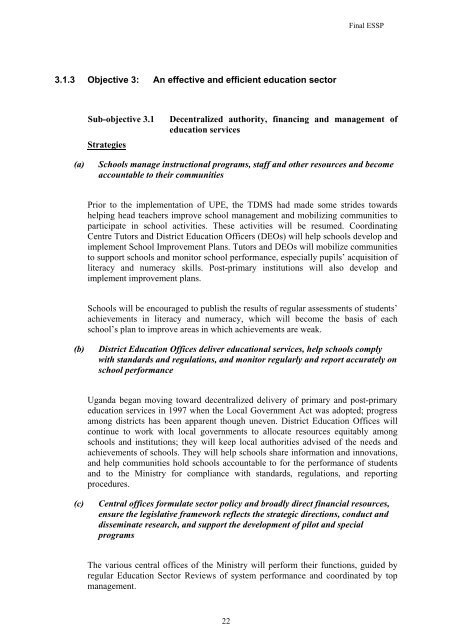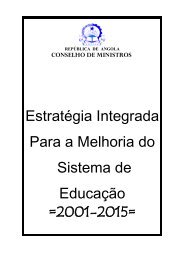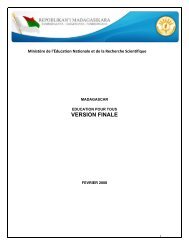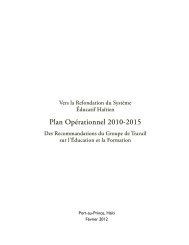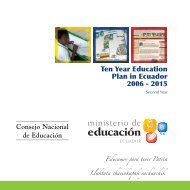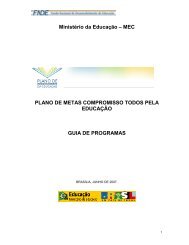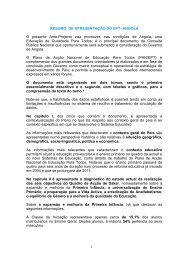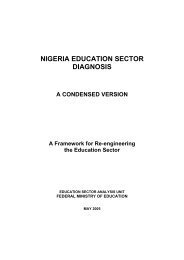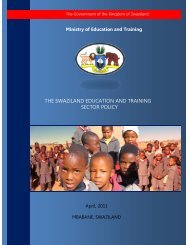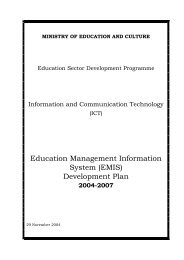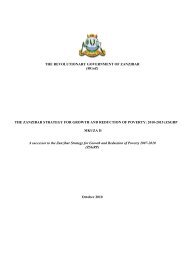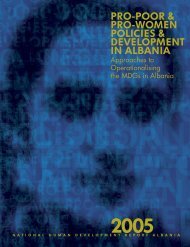Education Sector Strategic Plan 2004-2015 - Planipolis
Education Sector Strategic Plan 2004-2015 - Planipolis
Education Sector Strategic Plan 2004-2015 - Planipolis
Create successful ePaper yourself
Turn your PDF publications into a flip-book with our unique Google optimized e-Paper software.
3.1.3 Objective 3: An effective and efficient education sector<br />
Final ESSP<br />
Sub-objective 3.1 Decentralized authority, financing and management of<br />
education services<br />
Strategies<br />
(a) Schools manage instructional programs, staff and other resources and become<br />
accountable to their communities<br />
Prior to the implementation of UPE, the TDMS had made some strides towards<br />
helping head teachers improve school management and mobilizing communities to<br />
participate in school activities. These activities will be resumed. Coordinating<br />
Centre Tutors and District <strong>Education</strong> Officers (DEOs) will help schools develop and<br />
implement School Improvement <strong>Plan</strong>s. Tutors and DEOs will mobilize communities<br />
to support schools and monitor school performance, especially pupils’ acquisition of<br />
literacy and numeracy skills. Post-primary institutions will also develop and<br />
implement improvement plans.<br />
Schools will be encouraged to publish the results of regular assessments of students’<br />
achievements in literacy and numeracy, which will become the basis of each<br />
school’s plan to improve areas in which achievements are weak.<br />
(b) District <strong>Education</strong> Offices deliver educational services, help schools comply<br />
with standards and regulations, and monitor regularly and report accurately on<br />
school performance<br />
Uganda began moving toward decentralized delivery of primary and post-primary<br />
education services in 1997 when the Local Government Act was adopted; progress<br />
among districts has been apparent though uneven. District <strong>Education</strong> Offices will<br />
continue to work with local governments to allocate resources equitably among<br />
schools and institutions; they will keep local authorities advised of the needs and<br />
achievements of schools. They will help schools share information and innovations,<br />
and help communities hold schools accountable to for the performance of students<br />
and to the Ministry for compliance with standards, regulations, and reporting<br />
procedures.<br />
(c) Central offices formulate sector policy and broadly direct financial resources,<br />
ensure the legislative framework reflects the strategic directions, conduct and<br />
disseminate research, and support the development of pilot and special<br />
programs<br />
The various central offices of the Ministry will perform their functions, guided by<br />
regular <strong>Education</strong> <strong>Sector</strong> Reviews of system performance and coordinated by top<br />
management.<br />
22


